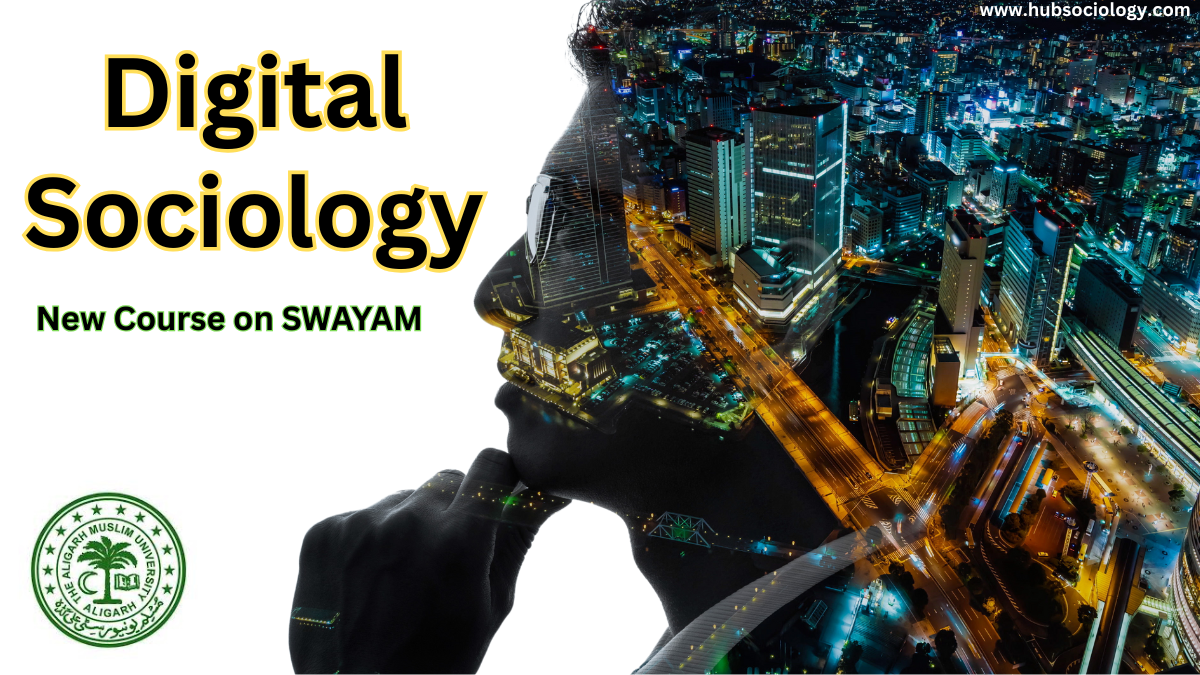As we move deeper into the 21st century, the role of digital technology in reshaping our society is becoming increasingly evident. From online education and telemedicine to digital marketplaces and algorithmic governance, the digital turn has transformed almost every sphere of human life. Recognizing the pressing need to critically examine these changes, SWAYAM, India’s premier online education platform, has introduced a groundbreaking course: “Digital Sociology”, offered by Professor Mohammad Swalehin of Aligarh Muslim University (AMU).
This 12-week postgraduate-level course is set to begin on July 21, 2025, and is a must-enroll for students, educators, professionals, and anyone keen on understanding the deep interconnection between society and the digital realm. Enrollment is completely free, and participants have the opportunity to earn a certification after appearing for a proctored exam.

Let’s dive into why this course is not just timely but essential, and how it can contribute to your academic, professional, and intellectual growth.
What Is Digital Sociology?
Digital Sociology is a rapidly emerging field that explores how digital technologies influence human behavior, social relationships, institutions, and power structures. It goes beyond simply using digital tools in research; it critically investigates how digital platforms, data flows, surveillance systems, and algorithmic decision-making shape the modern social world.
From the way we interact on social media, to how job markets are structured through digital platforms like LinkedIn or Naukri.com, or how governments use biometric data for welfare delivery — digital sociology helps decode these complex processes through a sociological lens.
Course Overview
The Digital Sociology course offered via SWAYAM stands out for its in-depth and structured approach to this new domain. Curated by Prof. Mohammad Swalehin, an esteemed sociologist from AMU, the course is designed to:
- Familiarize learners with core concepts in digital sociology.
- Explore the transformative impact of digital media and technologies on modern society.
- Introduce key theoretical frameworks such as Manuel Castells’ Network Society, Anthony Giddens’ structuration theory, and more.
- Analyze the digital divide, digital capitalism, cyber surveillance, and data privacy concerns.
- Encourage reflection on ethical and policy implications of digital transformation in India and beyond.
This course blends theory with real-world examples, making it accessible yet intellectually rich.
Key Themes Covered
Over the 12-week period, participants will explore a range of crucial topics, including:
- Evolution of the digital society
- The network society and global connectivity
- Platform capitalism and the gig economy
- Digital identities and self-presentation
- Social movements in the digital age
- Cyber surveillance and digital governance
- Data ethics and algorithmic bias
- Digital inequalities in the Indian context
Each module is supported by video lectures, reading materials, quizzes, and weekly assignments to reinforce understanding and promote critical thinking.

Why You Should Enroll
- Stay Relevant in the Digital Age:
As the digital revolution touches every aspect of life — from education and employment to health and politics — understanding its sociological impact is crucial. This course equips you with a framework to critically engage with digital trends. - Enhance Academic Credentials:
If you are a sociology student or academic, this course adds a new dimension to your studies. It complements classical and contemporary theories with insights from cutting-edge research in digital sociology. - Great for Civil Services & UGC NET Aspirants:
Digital transformations and data ethics are frequently discussed in competitive exams and interviews. This course provides a solid foundation for addressing such topics effectively. - Affordable and Accessible:
The course is free of cost, and the certification exam is affordably priced at ₹1000. This makes it a high-value learning opportunity open to all. - Led by a Reputed Scholar:
Prof. Swalehin brings years of teaching and research experience from one of India’s top institutions. His insights will be particularly valuable for Indian learners seeking localized perspectives.
Certification and Evaluation
Participants can choose to register for the proctored final exam, which will be conducted on October 25, 2025. To qualify for certification:
- Assignment score must be ≥10 out of 25 (based on best 8 out of 12 weekly assignments).
- Final exam score must be ≥30 out of 75.
- The final score will be a composite of both.
Those who meet these criteria will receive an e-certificate jointly issued by SWAYAM and AMU. This certificate can be a valuable addition to your CV or academic portfolio.
How to Enroll

Enrolling is simple:
- Visit the official course page: SWAYAM Digital Sociology Course
- Click on the Enroll Now button.
- Create or sign into your SWAYAM account.
- That’s it — you’re ready to begin your digital sociology journey!
Enrollment is open until July 28, 2025, so don’t delay.
Final Thoughts: A Call to Action
In a world increasingly driven by digital forces, understanding the sociological consequences of these changes is not a luxury — it’s a necessity. Whether you’re a student, teacher, researcher, policymaker, or just a curious learner, this course will deepen your understanding of how the digital world is shaping human lives, societies, and futures.
At Hub Sociology, we strongly recommend this course as part of your academic journey. It perfectly aligns with our mission to promote critical, interdisciplinary, and accessible sociological knowledge.
Enroll today and be part of the digital sociology revolution.

1 thought on “Explore Society in Digital Sociology: New Course on SWAYAM”